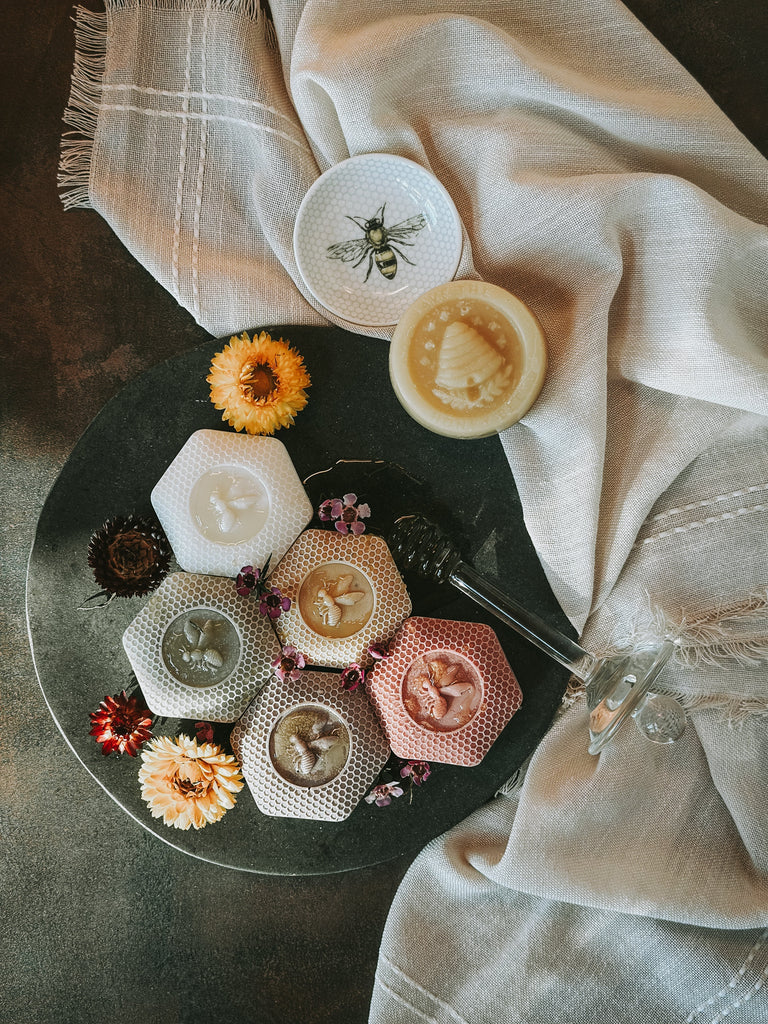When you first discover handmade soap, it’s natural to have a lot of questions. Whether you’re new to the world of handcrafted soap or looking to dive deeper into its unique qualities, there’s always something new to learn. Handmade soap is different from what you’ll find at the drugstore, and its charm lies in its individuality.
So, let’s answer some of the most common questions I get asked about handmade soap, and clear up any confusion you might have!
1. What’s the difference between handmade soap and store-bought soap?
The primary difference comes down to ingredients. Store-bought soap often contains harsh detergents, synthetic fragrances, and preservatives. Many commercial soaps are made using the detergent-based method, which involves stripping away natural oils and glycerin, leaving behind a bar that might feel dry or harsh on the skin.
Handmade soap, on the other hand, is made using simple, natural ingredients like oils, butters, and lye. Because it’s made in small batches, every bar is unique and retains the nourishing qualities of its ingredients. Glycerin (a natural byproduct of soapmaking) is also left in the soap, which helps moisturize the skin.
Handmade soap is gentler, richer, and, often, much more fragrant due to the natural essential oils used. It’s a small indulgence that makes a big difference for your skin!
2. Why is handmade soap so much more expensive than store-bought soap?
I get it—handmade soap can be pricier than mass-produced soap, and it’s understandable to wonder why. The short answer is that quality ingredients and time are at the heart of the price.
Making soap by hand takes effort and patience. There’s no factory assembly line or shortcuts. From sourcing high-quality oils and botanicals to allowing the soap to cure for weeks, every step requires attention and care. The ingredients themselves—like organic oils, clays, and essential oils—can be pricier than the synthetic fillers used in commercial soap. But this is what makes handmade soap so luxurious and nourishing for the skin.
3. How long does handmade soap last?
The lifespan of handmade soap depends on how you care for it. If you leave your bar sitting in a puddle of water, it will soften and dissolve more quickly. But if you store it on a well-draining soap dish, out of direct water flow, your soap will last much longer.
A good-quality handmade bar can last anywhere from two to four weeks or more with proper care. And since many handmade soaps are made with a high percentage of moisturizing oils, your skin will appreciate the extra hydration, making each use feel more like a pampering ritual than just a quick wash.
4. Does handmade soap work for sensitive skin?
Yes, handmade soap is often gentler and more suitable for sensitive skin compared to mass-produced soap. The ingredients are simple and natural, and you can find bars made with specific skin needs in mind, like those formulated for dry skin, eczema, or acne.
If you’re unsure about an ingredient, many soapmakers (myself included) are more than happy to provide details on the ingredients and their benefits. If you have allergies or specific skin concerns, there are soaps with gentle ingredients like oatmeal, honey, or calendula that are perfect for calming and nourishing sensitive skin.
5. Why does my handmade soap have soda ash on top?
Soda ash can form on the surface of soap during the curing process. It’s a natural occurrence that happens when the lye reacts with carbon dioxide in the air. It may look like a light, white powder, but it’s harmless and can easily be washed off with water.
Soda ash doesn’t affect the quality of the soap; it’s purely cosmetic. If you don’t mind the appearance, feel free to leave it. If you prefer a cleaner look, you can simply scrape or rinse it away. But don’t worry—it won’t affect your soap’s performance!
6. Can I use handmade soap on my face?
Absolutely! Many handmade soaps are made specifically for facial use, and many people with sensitive skin prefer them over commercial products. Handmade soaps can be incredibly nourishing, as they retain all the natural glycerin and oils that moisturize and soothe the skin.
Look for soaps with mild ingredients like castor oil, avocado oil, or aloe vera for a gentle yet effective face wash. As always, make sure to patch test first if you’re trying a new ingredient, especially if you have very sensitive or reactive skin.
7. How should I store my handmade soap?
Storing your handmade soap properly will help it last longer and keep it in good condition. The best way to store it is on a well-draining soap dish or tray. If you leave it sitting in water, it will get soft and dissolve faster.
If you’re not using it right away, you can store unused bars in a cool, dry place, away from direct sunlight. Keeping the soap in an airtight container or wrapping it in paper or cloth will help preserve its fragrance, too.
8. Does handmade soap make a difference?
Yes, it does! While store-bought soaps might get the job done in the short term, handmade soaps treat your skin with more care. The thoughtful selection of oils, natural ingredients, and the time spent crafting each bar all contribute to a product that’s gentler and more luxurious than what you’ll find on the shelf.
Plus, handmade soap supports artisans, encourages sustainable practices, and helps reduce waste—all things that make a difference for the planet, too!
Handmade soap is so much more than just a way to clean your skin. It’s an experience—a way to slow down, to indulge in the little things, and treat your skin to something nourishing and natural. Whether you’re a long-time fan or new to the world of handmade soap, I hope these answers clear up some of the questions you might have had.
And remember, if you ever have any more questions or need soap recommendations, I’m always here to help! Feel free to drop a comment or reach out.


Leave a comment